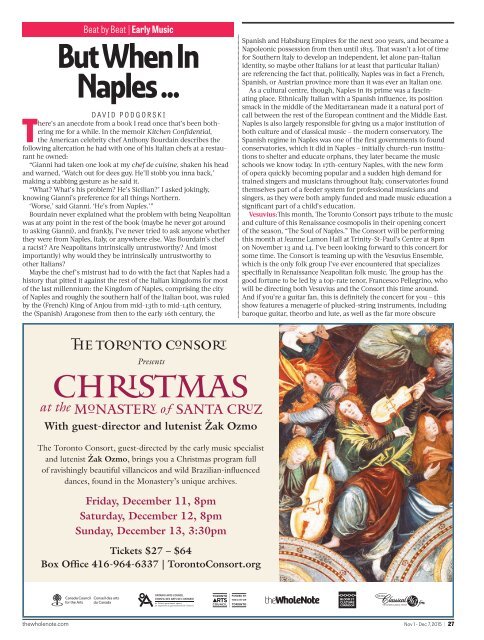Create successful ePaper yourself
Turn your PDF publications into a flip-book with our unique Google optimized e-Paper software.
Beat by Beat | Early Music<br />
But When In<br />
Naples ...<br />
DAVID PODGORSKI<br />
There’s an anecdote from a book I read once that’s been bothering<br />
me for a while. In the memoir Kitchen Confidential,<br />
the American celebrity chef Anthony Bourdain describes the<br />
following altercation he had with one of his Italian chefs at a restaurant<br />
he owned:<br />
“Gianni had taken one look at my chef de cuisine, shaken his head<br />
and warned, ‘Watch out for dees guy. He’ll stobb you inna back,’<br />
making a stabbing gesture as he said it.<br />
“What? What’s his problem? He’s Sicilian?’ I asked jokingly,<br />
knowing Gianni’s preference for all things Northern.<br />
‘Worse,’ said Gianni. ‘He’s from Naples.’”<br />
Bourdain never explained what the problem with being Neapolitan<br />
was at any point in the rest of the book (maybe he never got around<br />
to asking Gianni), and frankly, I’ve never tried to ask anyone whether<br />
they were from Naples, Italy, or anywhere else. Was Bourdain’s chef<br />
a racist? Are Neapolitans intrinsically untrustworthy? And (most<br />
importantly) why would they be intrinsically untrustworthy to<br />
other Italians?<br />
Maybe the chef’s mistrust had to do with the fact that Naples had a<br />
history that pitted it against the rest of the Italian kingdoms for most<br />
of the last millennium: the Kingdom of Naples, comprising the city<br />
of Naples and roughly the southern half of the Italian boot, was ruled<br />
by the (French) King of Anjou from mid-13th to mid-14th century,<br />
the (Spanish) Aragonese from then to the early 16th century, the<br />
Spanish and Habsburg Empires for the next 200 years, and became a<br />
Napoleonic possession from then until 1815. That wasn’t a lot of time<br />
for Southern Italy to develop an independent, let alone pan-Italian<br />
identity, so maybe other Italians (or at least that particular Italian)<br />
are referencing the fact that, politically, Naples was in fact a French,<br />
Spanish, or Austrian province more than it was ever an Italian one.<br />
As a cultural centre, though, Naples in its prime was a fascinating<br />
place. Ethnically Italian with a Spanish influence, its position<br />
smack in the middle of the Meditarranean made it a natural port of<br />
call between the rest of the European continent and the Middle East.<br />
Naples is also largely responsible for giving us a major institution of<br />
both culture and of classical music – the modern conservatory. The<br />
Spanish regime in Naples was one of the first governments to found<br />
conservatories, which it did in Naples – initially church-run institutions<br />
to shelter and educate orphans, they later became the music<br />
schools we know today. In 17th-century Naples, with the new form<br />
of opera quickly becoming popular and a sudden high demand for<br />
trained singers and musicians throughout Italy, conservatories found<br />
themselves part of a feeder system for professional musicians and<br />
singers, as they were both amply funded and made music education a<br />
significant part of a child’s education.<br />
Vesuvius:This month, The Toronto Consort pays tribute to the music<br />
and culture of this Renaissance cosmopolis in their opening concert<br />
of the season, “The Soul of Naples.” The Consort will be performing<br />
this month at Jeanne Lamon Hall at Trinity-St-Paul’s Centre at 8pm<br />
on November 13 and 14. I’ve been looking forward to this concert for<br />
some time. The Consort is teaming up with the Vesuvius Ensemble,<br />
which is the only folk group I’ve ever encountered that specializes<br />
specifially in Renaissance Neapolitan folk music. The group has the<br />
good fortune to be led by a top-rate tenor, Francesco Pellegrino, who<br />
will be directing both Vesuvius and the Consort this time around.<br />
And if you’re a guitar fan, this is definitely the concert for you – this<br />
show features a menagerie of plucked-string instruments, including<br />
baroque guitar, theorbo and lute, as well as the far more obscure<br />
thewholenote.com Nov 1 - Dec 7, 2015 | 27


